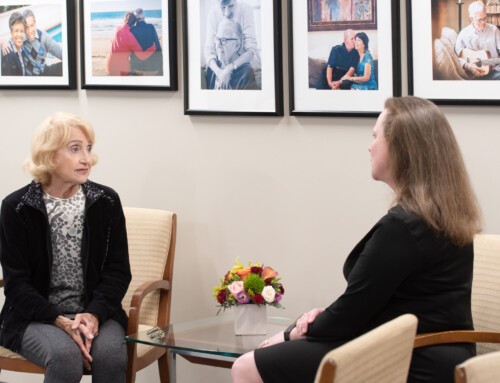Alzheimer’s San Diego is powered by a team of incredible social workers. This feature, Notes from a Social Worker, will give you a glimpse into their thoughts and feelings as they work with families impacted by dementia.
In the midst of a devastating disease/there are still lovely moments, laughs,/hands held and bodies touched/and the precious and fragile gift of time together.
– Judith Fox, I Still Do: Loving and Living with Alzheimer’s
“Our relationship has changed.”
We hear this often from people whose lives have been touched by dementia. And it is indeed inevitable that changes in a person’s memory, thinking, personality, and physical function will bring about changes in their intimate partner relationships. Many share a sense that they are losing some of their shared history and identity as a couple. Conversation may be more difficult than it once was, and misunderstandings, arguments, and conflict more common. Empathy, attraction, and interest in sex may change in unexpected ways, often leading to feelings of confusion and guilt. All of these experiences are normal, and all of these feelings are valid. Dementia will strain even the strongest of relationships, but there are ways to maintain connection and intimacy.
Earlier this year, Alzheimer’s San Diego offered a program called Changing Relationships and Intimacy, a two-hour educational workshop that explored these challenges and more. Spouses and partners shared their frustrations, guilt, and fears, and together we brainstormed some ways that care partners can manage these changes:
- Identify the ways that you uniquely give and receive love and affection with each other, and focus on those abilities that remain: enjoying music, sharing food, reminiscing, doing things to help each other, or saying kind words
- Adapt your rituals of intimacy as symptoms require, including the timing, location, frequency, or intensity of physical experience; remember the joys of kissing, holding hands, and massage
- Enjoy the moments, even if they may not become memories: continue to share experiences, and laugh together as often as you can
- Anticipate difficult periods of adjustment and grief, and forgive yourself and your partner for emotional reactions to the changes you are experiencing
- Find companionship and connection in other areas of your life as well, through friends, family, and recreational activities
- Acknowledge the complexities of loving someone with dementia, and get the help you need: education, support and discussion groups, mental health services, and regular respite
RELATED | Sign up for our latest classes & workshops
In my many years as a social worker and educator, I can think of few moments that were as transformative for me as the time spent facilitating this workshop. We cried together over shared losses, laughed at some of the inevitable absurdities that are a part of life with dementia, and celebrated the tender moments of connection that remain. And as is often the case in our education programs, I learned as much as I taught.
I’m grateful for the opportunity to develop education programs that meet the unique needs of the local community that we serve, and am proud of the safe, inclusive, and supportive spaces we create every day for open and honest dialogue and practical problem-solving. I look forward to offering this workshop again in the future, and in the meantime would encourage anyone who is struggling with issues in their relationship to reach out to our team of Dementia Care Consultants for support, knowledgeable advice, and connection to local resources that can help.





